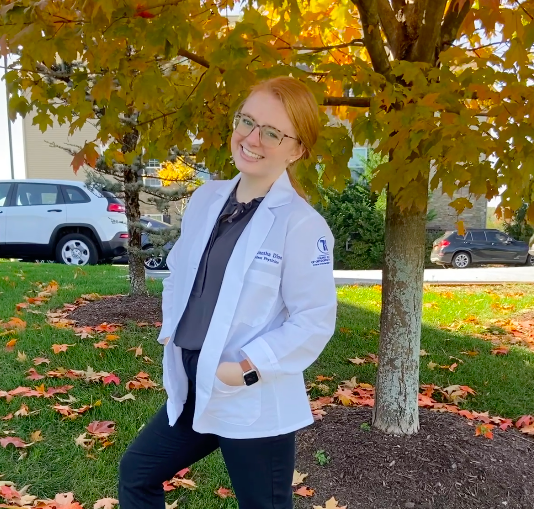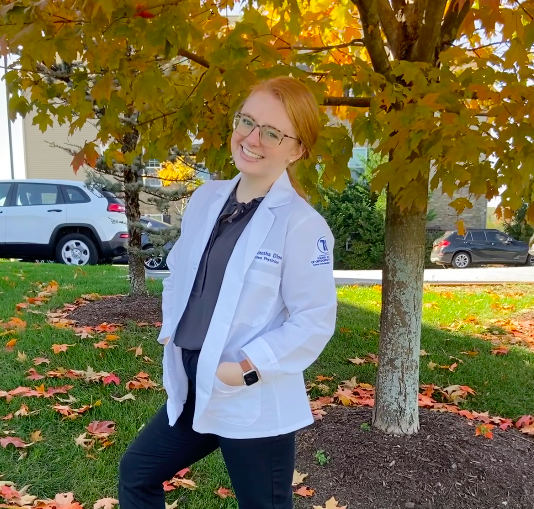
Sam Dion (’20) is a first-year DO (Doctor of Osteopathic Medicine) student at Touro College of Osteopathic Medicine. During her undergrad at UConn, she studied Physiology and Neurobiology on a pre-med track. I had the chance to interview her to learn more about what being a DO student entails, check out her interview below!
What is the difference between MD and DO?
The differences between DO (Doctor of Osteopathic Medicine) and MD (Doctor of Medicine) revolve around the philosophies that are central to those practices of medicines. MDs practice something called allopathic medicine, where they are trained to find the problem and treat the problem, whereas DOs are trained in osteopathic medicine which deals with the fact that the body has the ability to heal itself. DOs are more trained to look at a patient’s whole life. They help find out why the patient is presenting with the condition that they are, but also what is going on in their life that may have caused this. The tag line is that DOs focus on holistic care. The other main difference is that DOs learn osteopathic manipulative medicine (OMM), which centralizes around the idea that the body has self-healing purposes.
Why did you pick DO? Looking back, are you happy with where you are now?
I am super happy with my decision! I am really passionate about health education, and I wanted to be in a learning environment that would better teach me how to incorporate health education in my patients’ lives. I also knew that osteopathic medicine is known for producing outstanding primary care physicians, so being interested in going into primary care, that was something that I thought would help me learn how to talk to a patient like they’re a person, rather than just trying to get to what’s making them feel a certain way. Really the main differences between MD and DO, in terms of choosing between them, is do you think OMM will be a valuable tool for you to use, and where do your professional and educational interests lie. One of the things I have appreciated through learning OMM is how it helps interrelate different topics we are learning in classes. We could be learning about the neuromuscular unit in Physiology and learning about the different muscles in Anatomy, and those two come together to help us better understand OMM, and OMM conversely helps us understand things in other classes, which I find super cool and helpful. On top of that, getting to practice OMM for two hours every week is a clinical encounter, so we get a lot more hands-on time practicing clinical encounters.
What does a day in your life look like?
Every day looks different, but Thursday is probably the best day to use as an example. Classes start at 8:00 – that’s pretty typical for when classes start. I start the day off with Physiology, right now we’re learning about the pulmonary system. After that we have Anatomy. Next is Biochemistry, which is followed by a Biochem supplemental. During the Biochem supplemental, there is a case written up for us and we talk through a potential diagnosis, how we would treat them, and how it relates to the course material. They are super cool because they are not only run by the biochem faculty, but we also have clinicians come in to talk about how it presents in the clinic. During lunch break, clubs will meet, so I had a SIM team meeting. SIM team is basically medical simulations, where we act as the physicians caring for a simulator. It is essentially a high-tech doll that has vital signs, blood pressure, and a heart rate. After that, I had Anatomy Lab, followed by OMM Lab. That’s it for classes on that day, but I go to Physiology TA hours later on, where they review what we learned in class. I then reviewed for some of my exams and went to bed around 11:00.
How do you balance your personal life with academics?
I found a women’s soccer league and I go play soccer every Saturday morning with a group of women who range in age from my age to someone who has grandchildren. That’s a cool getaway every weekend that I love. Our school also has a free yoga class, so I go to yoga every Tuesday night. Also [my dog] demands attention, so he forces me to take time away from the computer. It has been hard though; an unexpected challenge was setting boundaries with friends and family to make sure I had enough time for my studies, but they knew I wasn’t ignoring them, and they are important to me. It is a constant practice.
What are your career goals?
At this point, my career goals are still pretty broad. I am interested in pediatrics, family medicine, and sports medicine, but it is up in the air. During third and fourth years of medical school you do rotations so you get hands-on experience with the different fields of medicine, so that’s when I’m really going to figure out what I want to do.
As an undergrad, were there any programs or resources that you found beneficial in getting to where you are today? Any specific faculty you felt played a role in your success?
One thing that I found super helpful coming to medical school was having prior research experience. Research really taught me how to think critically and ask questions, so when it comes to understanding a clinical case it helps me look at everything a little more critically. Even though I wasn’t doing traditional lab-bench research as I was doing research with Dr. Casa and KSI, it was helpful learning in a team environment. To this day I would like to thank Dr. Tanner for giving me such a good visual of sodium-potassium pumps because that continues to follow me. In undergrad, I remember taking Cardiorespiratory physiology with Dr. Mulkey made me so excited to learn and how much it helped me feel sound in my decision to pursue academics past undergrad. Overall the PNB department has great professors.
If you are interested in learning more about all that a DO program has to offer, check out these links below!
https://www.aacom.org/become-a-doctor/u-s-colleges-of-osteopathic-medicine

